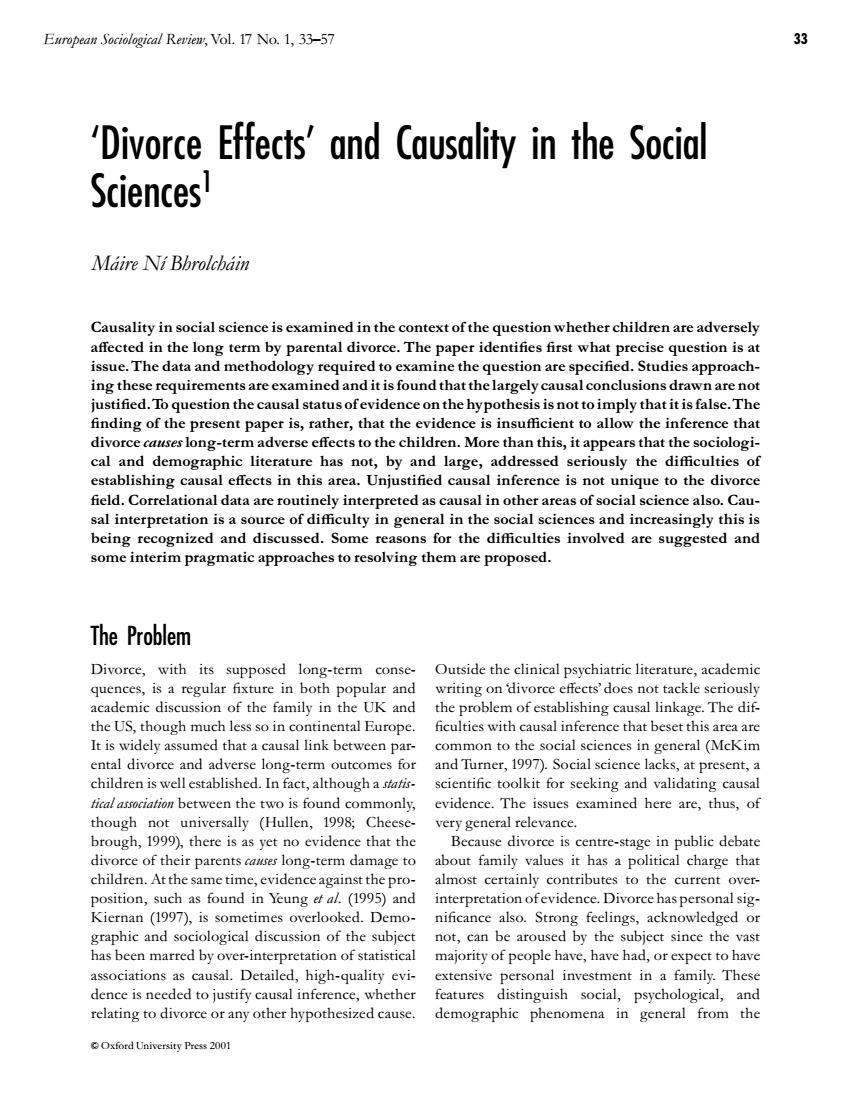正在加载图片...

European Sociological Revien,Vol.17 No.1,33-57 33 'Divorce Effects'and Causality in the Social Sciencesl Maire Ni Bbrolchain Causality in social science is examined in the context of the question whether children are adversely affected in the long term by parental divorce.The paper identifies first what precise question is at issue.The data and methodology required to examine the question are specified.Studies approach- ing these requirements are examined and it is found that the largely causal conclusions drawn are not justified.To question the causal status ofevidence on the hypothesis is not to imply that it is false.The finding of the present paper is,rather,that the evidence is insufficient to allow the inference that divorce causes long-term adverse effects to the children.More than this,it appears that the sociologi- cal and demographic literature has not,by and large,addressed seriously the difficulties of establishing causal effects in this area.Unjustified causal inference is not unique to the divorce field.Correlational data are routinely interpreted as causal in other areas of social science also.Cau- sal interpretation is a source of difficulty in general in the social sciences and increasingly this is being recognized and discussed.Some reasons for the difficulties involved are suggested and some interim pragmatic approaches to resolving them are proposed. The Problem Divorce,with its supposed long-term conse-Outside the clinical psychiatric literature,academic quences,is a regular fixture in both popular and writing on divorce effects'does not tackle seriously academic discussion of the family in the UK and the problem of establishing causal linkage.The dif- the US,though much less so in continental Europe.ficulties with causal inference that beset this area are It is widely assumed that a causal link between par-common to the social sciences in general (McKim ental divorce and adverse long-term outcomes for and Turner,1997).Social science lacks,at present,a children is well established.In fact,although a statis-scientific toolkit for seeking and validating causal tical association between the two is found commonly,evidence.The issues examined here are,thus,of though not universally (Hullen,1998;Cheese-very general relevance. brough,1999),there is as yet no evidence that the Because divorce is centre-stage in public debate divorce of their parents canses long-term damage to about family values it has a political charge that children.At the same time,evidence against the pro-almost certainly contributes to the current over- position,such as found in Yeung ef al.(1995)and interpretation ofevidence.Divorce has personal sig- Kiernan (1997),is sometimes overlooked.Demo-nificance also.Strong feelings,acknowledged or graphic and sociological discussion of the subject not,can be aroused by the subject since the vast has been marred by over-interpretation of statistical majority of people have,have had,or expect to have associations as causal.Detailed,high-quality evi-extensive personal investment in a family.These dence is needed to justify causal inference,whether features distinguish social,psychological,and relating to divorce or any other hypothesized cause.demographic phenomena in general from the Oxford University Press 2001
!
"
!
#
!
$
!
!
"
!
#$ %&&'( )
%&&&*
+
,
#%&&-*
#%&&.*
"
/
/
0
1
2 3
4
"
" 5
#6
5 %&&.*
"
"
"
5
7
"
/
/
5
1
8
9::%
; %. < % ==>-. ��������������������������������������������������������������������������������������������������������������������������������������������������������������������������������������������������������������������������������������������������������������������������������������������������